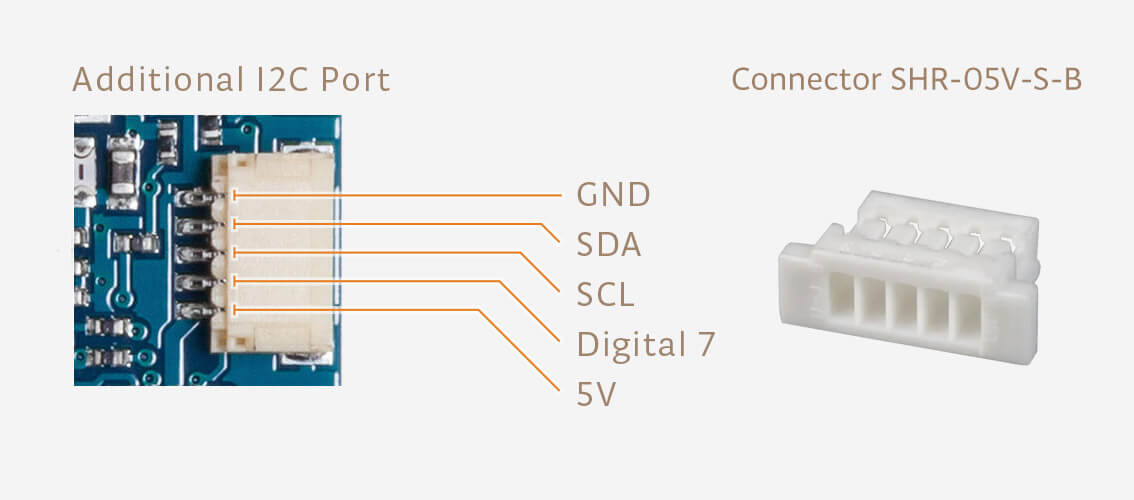The Arduino MKR WAN 1310 board offers a practical and cost-effective solution for adding LoRa® connectivity to low-power projects. This open-source board can connect to the Arduino IoT Cloud.
MKR WAN 1310 brings a series of improvements compared to its predecessor, the MKR WAN 1300. It still features the low-power Microchip® SAMD21 processor, Murata CMWX1ZZABZ LoRa® module, and the characteristic cryptographic chip of the MKR family (ECC508). However, the MKR WAN 1310 includes a new battery charger, 2MB of SPI Flash, and improved control over the board's power consumption.
The latest changes have significantly improved the battery life of the MKR WAN 1310. When properly configured, power consumption can now go as low as 104uA! It's also possible to power the board using the USB port; run it on battery or without batteries - the choice is yours.
Data logging and other OTA (Over The Air) functions have become possible since the inclusion of the built-in 2MByte Flash. This exciting new feature allows you to transfer configuration files from infrastructure to the board, create your own script commands, or locally store data to send when the best connection is available. The MKR WAN 1310's crypto chip enhances security by storing credentials and certificates in a built-in secure element.
These features make it an ideal IoT node and building block for low-power wide-area IoT devices.
The "Getting Started" section includes all the information you need to configure your board, use the Arduino Software (IDE), and get started with coding and working on electronics projects.
Arduino MKR WAN 1310 is based on the SAMD21 microcontroller.
|
MICROCONTROLLER |
SAMD21 Cortex®-M0+ 32bit Düşük Güç ARM MCU (datasheet) |
|
RADIO MODULE |
CMWX1ZZABZ (datasheet) |
|
BOARD POWER SUPPLY (USB/VIN) |
5V |
|
SECURE ELEMENT |
ATECC508 (datasheet) |
|
SUPPORTED BATTERIES |
Rechargeable Li-Ion, or Li-Po, minimum 1024 mAh capacity |
|
BOARD OPERATING VOLTAGE |
3.3V |
|
DIGITAL I/O PINS |
8 |
|
PWM PINS |
13 (0 .. 8, 10, 12, 18 / A3, 19 / A4) |
|
UART |
1 |
|
SPI |
1 |
|
I2C |
1 |
|
ANALOG INPUT PINS |
7 (ADC 8/10/12 bit) |
|
ANALOG OUTPUT PINS |
1 (DAC 10 bit) |
|
EXTERNAL INTERRUPTS |
8 (0, 1, 4, 5, 6, 7, 8, 16 / A1, 17 / A2) |
|
DC CURRENT PER I/O PIN |
7 mA |
|
CPU FLASH MEMORY |
256 KB (Internal) |
|
QSPI FLASH MEMORY |
2MByte (External) |
|
SRAM |
32 KB |
|
EEPROM |
no |
|
CLOCK SPEED |
32.768 kHz (RTC), 48 MHz |
|
LED_BUILTIN |
6 |
|
USB |
Full-Speed USB Device and embedded Host |
|
ANTENNA GAIN |
2dB (Integrated pentaband antenna) |
|
CARRIER WAVE FREQUENCY |
433/868/915 MHz |
|
OPERATING REGION |
EU/US (approved) other countries check spectrum availability in your region. |
|
LENGTH |
67.64 mm |
|
WIDTH |
25 mm |
|
WEIGHT |
32 gr. |
Click here to view the full pinout diagram.
The MKR WAN 1310 features an additional connector that extends the I2C data bus. It is a small form-factor 5-pin connector with a 1.0 mm pitch. Mechanical details of the connector can be found on the connector's datasheet.
In Arduino, this is also referred to as the Eslov self-identification port for the I2C bus. It comes with SDA, SCL, GND, +5V, and an additional digital pin to send alerts to normal I2C devices connected to it. The pinout is shown in the image below:

If you are interested in designing your own modules for Arduino boards with this expansion port, we recommend using connector code: SHR-05V-S-B, as shown in the image.
To download the Fritzing file, click here.
You can order the Arduino MKR WAN 1310 (Original) product from the Arduino Models category at SAMM Market with competitive prices, same-day shipping, and fast delivery advantages.